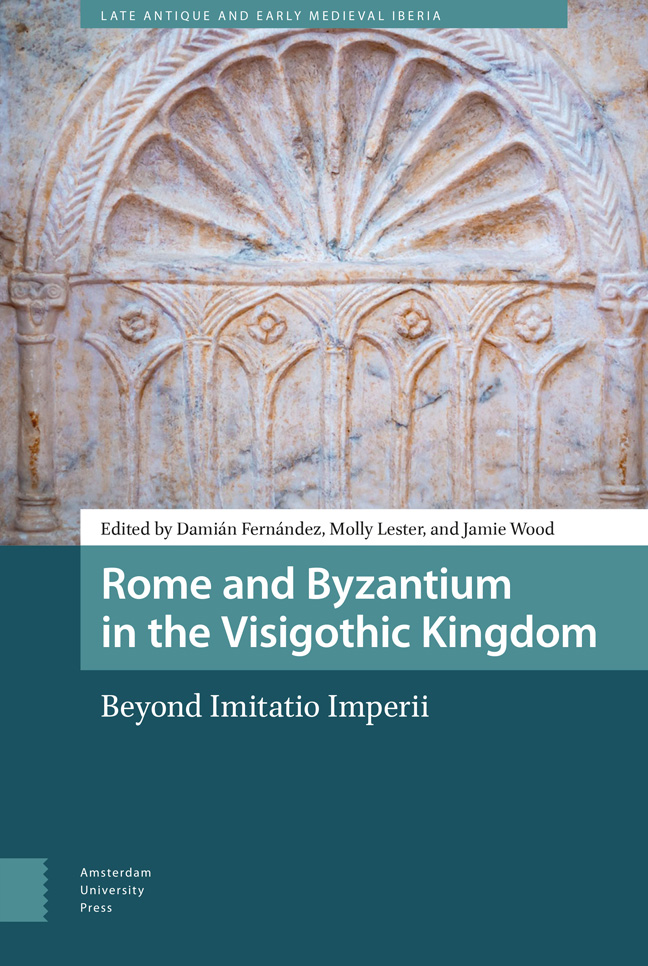Book contents
- Frontmatter
- Contents
- List of Figures and Tables
- Abbreviations
- Acknowledgements
- Maps
- Introduction
- 1 Visigothic Spain and Byzantium: The Story of a Special (Historiographical) Relationship
- 2 The Development of the Visigothic Court in the Hagiography of the Fifth and Sixth Centuries
- 3 Experiments in Visigothic Rulership: Minting and Monetary Reforms under Alaric II
- 4 A Comparison of Roman and Visigothic Approaches to Exile
- 5 The Roman Jewel in the Visigothic Crown: A Reassessment of the Royal Votive Crowns of the Guarrazar Treasure
- 6 Capitalhood in the Visigothic Kingdom
- 7 Making Rite Choices: Roman and Eastern Liturgies in Early Medieval Iberia
- 8 Ethnicity and Imitatio in Isidore of Seville
- 9 Re-imagining Roman Persecution in the Visigothic Passions
- 10 Romanness in Visigothic Hagiography
- 11 Empire and the Politics of Faction: Mérida and Toledo Revisited
- 12 The Agents and Mechanics of Connectivity: The Mediterranean World and the Cities of the Guadiana Valley in the Sixth Century
- 13 Staying Roman after 711?
- Index
10 - Romanness in Visigothic Hagiography
Published online by Cambridge University Press: 20 February 2024
- Frontmatter
- Contents
- List of Figures and Tables
- Abbreviations
- Acknowledgements
- Maps
- Introduction
- 1 Visigothic Spain and Byzantium: The Story of a Special (Historiographical) Relationship
- 2 The Development of the Visigothic Court in the Hagiography of the Fifth and Sixth Centuries
- 3 Experiments in Visigothic Rulership: Minting and Monetary Reforms under Alaric II
- 4 A Comparison of Roman and Visigothic Approaches to Exile
- 5 The Roman Jewel in the Visigothic Crown: A Reassessment of the Royal Votive Crowns of the Guarrazar Treasure
- 6 Capitalhood in the Visigothic Kingdom
- 7 Making Rite Choices: Roman and Eastern Liturgies in Early Medieval Iberia
- 8 Ethnicity and Imitatio in Isidore of Seville
- 9 Re-imagining Roman Persecution in the Visigothic Passions
- 10 Romanness in Visigothic Hagiography
- 11 Empire and the Politics of Faction: Mérida and Toledo Revisited
- 12 The Agents and Mechanics of Connectivity: The Mediterranean World and the Cities of the Guadiana Valley in the Sixth Century
- 13 Staying Roman after 711?
- Index
Summary
Abstract
This chapter evaluates the use (or not) of Roman identities and institutions in Visigothic hagiography. Visigothic hagiographical materials display a telling absence of ‘Romanness’, understood as a collective or individual consciousness of belonging to a Roman cultural tradition. This absence is tied to the erosion of ethnic binaries during the political construction of the Gothic kingdom, a process in which both the Roman aristocracy and the Catholic episcopate participated. I argue that in the seventh century, invocations of Roman heritage did not represent a continuation of ethnic conflict; rather, the hagiographers in their treatment of Rome's legacy were less interested in articulating the Roman identities of contemporary individuals than in placing their subjects within a world with recognizably Roman features.
Keywords: Romanness; Visigothic kingdom; hagiography; Christianism; Late Roman aristocracy; ethnicity
In the first third of the seventh century, a cleric from the ecclesiastical and monastic complex of St Eulalia, in Emerita (Mérida), in southwestern Hispania, felt it appropriate to note the Roman origin of one of the figures in the text that he was writing, the Lives of the Fathers of Mérida, a series of accounts of the lives of ecclesiastics from sixth-century Mérida. This anonymous hagiographer made explicit reference to the Roman origins of the dux Claudius, a military leader and governor in the service of the Gothic king Reccared (r. 586–601) in the province of Lusitania, stating that he was of noble lineage and had been born to Roman parents: ‘Idem vero Claudius nobili genere hortus Romanis fuit parentibus progenitus.’
The Mérida hagiographer's invocation of the Lusitanian dux's ‘Roman’ parentage is strikingly unique within the text, and his evident desire to underscore a figure's Roman heritage is more suggestive than it may seem. Given that the Iberian peninsula was (depending on the region) subject to Roman rule for more than half a millennium, we might expect to find a strong sense of Romanness among its inhabitants well into the post-Roman period. I will refer to ‘Romanness’ as a collective or individual consciousness of belonging to a Roman cultural tradition. Such tradition(s) could have been received through numerous ways, such as the persistence of Roman law, the memory of aristocratic families of Roman origins, and the cult of late Roman saints, among others.
- Type
- Chapter
- Information
- Rome and Byzantium in the Visigothic KingdomBeyond Imitatio Imperii, pp. 253 - 276Publisher: Amsterdam University PressPrint publication year: 2023



